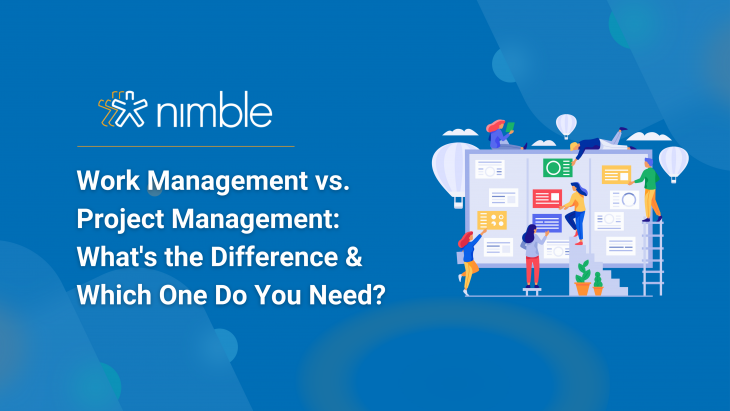Choosing between Work Management and Project Management is crucial for business success, whether dealing with daily tasks or larger projects. Deciding between the two can be challenging due to their unique elements.
While both aim for efficient task completion, they differ in focus and scope. This blog explores the distinctive components of Work Management and Project Management, assisting you in determining which aligns better with your business needs.
What is Work Management?
At its core, Work Management involves the strategic allocation of resources, time, and efforts to achieve predetermined goals and objectives.

Work Management contains several key components such as task planning, assignment, tracking, and evaluation, which generally follow a lifecycle such as this:
- Task Planning: Work Management begins with a thoughtful and strategic planning phase, outlining the tasks at hand, their priorities, and the timeline for completion.
- Assignment: Once tasks are identified, they are assigned to relevant individuals or teams based on skills, availability, and workload.
- Tracking: Continuous monitoring of task progress is crucial for identifying potential bottlenecks, ensuring deadlines are met, and making necessary adjustments.
- Evaluation: After completion, an evaluation phase allows for reflection on the efficiency of the process, enabling improvements for future tasks.
Work Management can be applied across virtually any industry where streamlined operations are the key to success. Some of the most popular industries that meet this criteria include Marketing and Advertising, Information Technology (IT), Healthcare, and Sales.
What is Project Management?
Project Management is a structured approach that ensures projects are executed seamlessly, meeting predetermined goals within defined constraints. It involves a systematic method for initiating, planning, executing, controlling, and closing projects.

Below are a few components of project management:
- Initiation: The project’s purpose, scope, and feasibility are identified, and initial objectives are outlined.
- Planning: A comprehensive roadmap is developed, detailing tasks, timelines, resource allocation, and potential risks.
- Execution: The outlined plan is set into motion, and project tasks are carried out as per the established schedule.
- Control: Ongoing monitoring of project progression allows for adjustments to be made, ensuring alignment with goals.
- Closing: The project is formally concluded, and its success is evaluated. Lessons learned contribute to future improvements.
Essentially, Project Management provides a clear direction for organizations tackling specific projects. By applying these steps, businesses can effectively navigate projects more easily, ensuring success and achieving goals with efficiency and precision.
What Are the Key Differences of Each?
Understanding Work Management and Project Management distinctions is crucial for streamlined operations. Each plays a unique role in ensuring tasks and projects are executed successfully, but their focus and applications differ significantly.
Scope & Focus
Work Management deals with the day-to-day activities and tasks that contribute to the ongoing operations of a business. It encompasses the broader scope of routine responsibilities and aims to optimize efficiency in regular workflows. The focus is on maintaining a steady and productive work pace without necessarily being tied to a specific project’s completion. On the other hand, Project Management has a more narrow focus. It is concerned with the planning, execution, and completion of specific projects with defined objectives. Project Management comes into play when there is a distinct goal to achieve, and it involves a temporary endeavor with a clear beginning and end.
Time Frames
Work Management operates on an ongoing basis, with tasks and responsibilities distributed across regular business operations. It doesn’t have a defined endpoint and is an ongoing effort to keep the wheels of the organization turning smoothly. Project Management, in contrast, is time-bound. It has a defined timeframe, usually with a set start and end date. Projects have specific deadlines for the completion of tasks and the overall achievement of project goals.

Goals & Deliverables
The goals of Work Management are often continuous improvement, enhanced productivity, and the smooth functioning of day-to-day operations. Deliverables are typically ongoing and contribute to the overall efficiency of the organization. In Project Management, the goals are specific and measurable. The focus is on delivering a unique product, service, or result within the defined constraints of time, budget, and scope. Deliverables are the tangible outcomes achieved by the end of the project.
Understanding these key differences between Work Management and Project Management is essential for businesses to implement the right strategies and methodologies depending on their objectives and the nature of the work at hand.
Choosing the Right Approach for Your Business
So, how can you choose the right approach for your business?
Start by conducting a thorough assessment of your organizational requirements. Consider the nature of your tasks and objectives to determine the most suitable approach for your business. For example, Work Management is ideal for businesses that are engaged in continuous and routine operations. Suited for organizations focusing on ongoing improvement and optimization, it proves effective when the goal is to enhance day-to-day productivity and workflows. On the other hand, Project Management is best suited for businesses with specific, time-bound projects or ventures. It thrives in organizations with clearly defined project goals and deliverables, proving effective when structured planning and execution within a defined timeframe are essential.

Then, begin to weigh the pros and cons of each approach.
A major pro of work management is that it supports ongoing efficiency and productivity, and adapts well to evolving and dynamic business environments. It fosters a culture of continuous improvement and promotes consistent optimization. However, a con to consider is that it may lack the structured focus needed for achieving specific project goals. Challenges may arise in managing and prioritizing tasks with competing deadlines, potentially leading to inefficiencies.
With project management a pro may be that it provides a structured framework for planning and execution, ensuring a clear definition of goals and deliverables. It is particularly effective for managing resources within a set timeframe, promoting a systematic approach to achieving objectives. On the flip side, Project Management may be less adaptable to sudden changes or evolving project scopes. The thorough planning it requires can be time-consuming, potentially impacting the flexibility needed in dynamic business environments.
Tools for Mastering Work & Project Management
Whether you opt for a work management or project management approach for your business, leveraging pre-made software and tools is instrumental in maintaining organization.
When it comes to work management, there are a plethora of tools available:
- Trello: Trello is a versatile and user-friendly tool that uses boards, lists, and cards to organize tasks and projects. Its visual interface makes it easy to collaborate and track progress.
- Asana: Asana is a powerful work management tool that allows teams to coordinate and manage tasks effortlessly. It provides a centralized platform for communication and collaboration, enhancing overall productivity.
- Todoist: If simplicity is your preference, Todoist is a straightforward yet effective task management tool. It helps organize tasks, set priorities, and track progress without unnecessary complexity.
- Microsoft Planner: Integrated with the Microsoft 365 suite, Planner facilitates work management within the familiar Microsoft environment. It allows for seamless collaboration and task tracking.

Just like with work management, there are several notable project management software choices available:
- Nimble: Nimble stands out not only as a robust Customer Relationship Management (CRM) tool but also as a valuable asset for project management. With Nimble’s Workflows, you can automate repetitive tasks, ensuring a smoother workflow. Additionally, Nimble’s Task Reminders keep you on track by providing timely alerts for essential project milestones. This dual functionality makes Nimble a versatile tool for both managing day-to-day work and overseeing project-specific tasks, enhancing overall business efficiency.
- Jira: Jira is a robust project management tool, particularly popular among software development teams. It facilitates agile project management, issue tracking, and collaboration.
- Wrike: Wrike is a comprehensive project management tool that combines project planning, collaboration, and reporting. Its customizable features cater to a variety of project management needs.
- Basecamp: Basecamp is a user-friendly project management tool that simplifies collaboration. It offers tools for task management, communication, and file sharing, streamlining project workflows.
- Smartsheet: Smartsheet is an adaptable project management tool that combines the familiarity of spreadsheet interfaces with powerful project management features. It’s suitable for a wide range of project types.
Navigate Work & Project Management with Nimble
Successful management is crucial for business achievements, be it handling daily tasks or more significant, long-term projects. In this blog, we have clarified the differences between Work Management and Project Management to help you choose the correct approach for your business.
Consider using flexible tools like Nimble to boost efficiency in both areas, helping you to ultimately reach your business goals.

